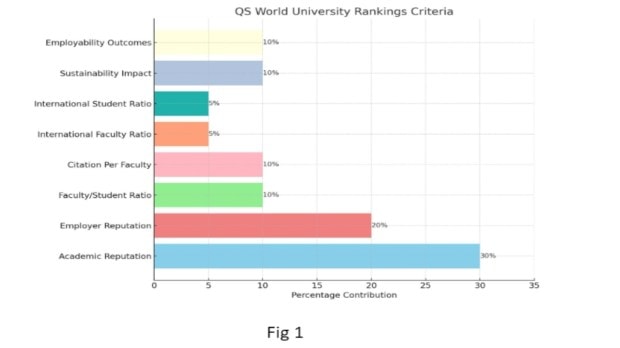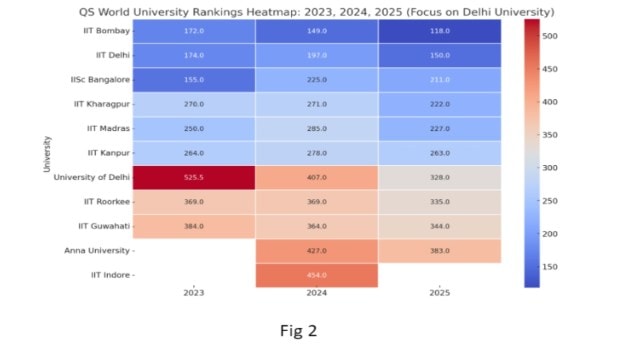-By Purushottam Kumar Arya & Manish Kumar Tiwary
In today’s world, people often spend a lot of time researching and comparing products and services before making a choice. However, this level of scrutiny is needed when selecting universities for education. Recognizing the importance of informed decisions in higher education, Institutions worldwide strive for excellence and recognition.
The QS World University Rankings, established in 2004 by Quacquarelli Symonds (QS), addresses this need by providing a comprehensive and trusted evaluation of educational institutions. This article delves into the diverse impact of QS rankings on education, highlighting how they influence institutional strategies, student choices, and the broader academic landscape.
Understanding QS Rankings:
QS Rankings is the most reputed Ranking among the major global university rankings like the Times Higher Education (THE) World University Rankings and the Academic Ranking of World Universities (ARWU), and offers an impartial assessment of nearly 1,500 institutions across 104 locations.
The QS World University Rankings evaluates universities based on several key criteria, each reflecting different aspects of academic excellence and global impact as in Fig. Academic Reputation, accounting for 30% of the score is determined by a global survey of over 130,000 academics who identify leading institutions in various fields, showcasing the quality and impact of research and teaching. Employer Reputation, contributing 20%, is based on feedback from over 75,000 employers worldwide, highlighting which universities produce the most employable and skilled graduates.
The Faculty/Student Ratio, at 10%, measures the number of academic staff per student, providing insight into teaching quality and available resources. Citation Per Faculty, also 10%, evaluates the number of citations received by research papers per academic staff member, indicating the quality and impact of research output. The International Faculty Ratio, which makes up 5% of the ranking, calculates the proportion of international academic staff, reflecting the diversity and international reach of the institution. Similarly, the International Student Ratio, another 5%, measures the proportion of international students, showcasing the university and global appeal and inclusivity.
At 10%, Sustainability Impact assesses an institution& contributions to the United Nations& Sustainable Development Goals (SDGs), highlighting its commitment to social and environmental responsibility. Finally, Employability Outcomes, also 10%, measure how well universities prepare their graduates for the job market, considering factors like alumni success, industry partnerships, and employability skills development. Together, these criteria provide a comprehensive and balanced evaluation of universities, helping students and institutions alike to make informed decisions in higher education.

The graph with multiple colors representing the QS World University Rankings criteria and their respective percentage
contributions. This colorful representation makes it easier to understand the different criteria.
The influence of QS World University Rankings on education is profound and multifaceted. These rankings affect more than just university selection; they drive institutions to align with global objectives, contribute significantly to societal progress, and acknowledge the diverse impacts of education on various aspects of human life and society.
Universities, policymakers, and stakeholders need to engage in meaningful discussions about the role of these rankings in shaping the future of education. This dialogue should ensure that the pursuit of excellence meets students’ and society’s diverse and changing needs. As QS rankings evolve, the conversation about their impact on the educational landscape should also grow and adapt.
Delhi University (DU) has achieved the top spot among central universities in India in the QS World University Rankings 2025. It has also risen to 7th place among all institutions in the country, up from 9th place last year. Vice Chancellor Professor Yogesh Singh emphasized that DU ( University of Delhi ) has made the most significant progress among the top 10 institutions in India, advancing by 79 ranks.
Professor Singh praised the entire DU community for this achievement, attributing it to the significant contributions of faculty and students to the academic environment and nation-building efforts. The University of Delhi has notably improved its ranking, reaching 328th in the QS World University Rankings 2025 from 407th last year, placing it among the top 22% of institutions globally. In specific indicators, DU ranks among the top 270 institutions worldwide in four key areas:
44th in Employment Outcomes, 220th in Sustainability, 225th in Academic Reputation, and 269th in Employer Reputation.Among Indian institutions, DU is ranked 1st in Employment Outcomes and Sustainability, 3rd in International Research Network, 5th in Academic Reputation, and 8th in Employer Reputation.
The university has shown improvement in five out of nine performance indicators, including sustainability, academic reputation, employer reputation, international research network, and citations per faculty. These indicators evaluate various aspects such as social and environmental impact, academic excellence, job readiness of graduates, international research partnerships, and the impact and quality of scientific work produced by universities.

As Fig 2, Analysis of Delhi University in QS World University Rankings (2023-2025): Delhi University (DU) has remarkably improved its QS World University Rankings over the past three years. In 2023, DU was ranked in the 521- 530 range. In 2024, DU’s ranking improved significantly to 407. By 2025, DU achieved an even higher rank of 328. This consistent upward trend highlights DU&s growing academic reputation and enhanced performance metrics.
The heat map Fig 2 ,provide a visual representation of the rankings, highlighting the differences between 2023, 2024, and 2025. The color gradient indicates the ranking positions, with darker colors representing lower ranks and lighter colors
indicating higher ranks. (In Blue colors). Detailed Analysis of Delhi University (DU) in QS World University Rankings.
The journey of Delhi University (DU) in the QS World University Rankings over the past three years is a story of dedication, growth, and relentless pursuit of academic excellence. In 2023, DU found itself in the 521-530 range. This position, while respectable, highlighted the challenges faced by the university amidst global competition.
Faculty, student ratio, academic reputation, and research output, contributed to this ranking. Fast forward to 2024, and DU made a remarkable leap to the 407th position. This significant improvement was the result of concerted efforts across various fronts. The university’s academic reputation was boosted as it became more recognized among global scholars. Employers, too, began to take greater notice of DU graduates, enhancing the university& employer reputation. The faculty/student ratio and increased research output played crucial roles in this upward trajectory.
The upward momentum continued into 2025, with DU climbing further to secure the 328th spot. This consistent improvement reflects the university’s unwavering commitment to enhancing its academic profile and infrastructure. DU, increased international collaborations, student exchanges, and sustainability initiatives have greatly contributed to its rising global appeal. Investments in research facilities and innovative projects have also paid off, leading to more impactful research outcomes.
Moreover, the ongoing efforts to improve the quality of education, including curriculum updates and modern teaching methods, have solidified DU’s reputation as a leading institution of higher learning. The heat map in Fig2 explains DU, rankings alongside other top Indian institutions over consecutive years 2023, 2024, and 2025. The visual progression clearly shows DU’s remarkable rise in the rankings, moving from the 521-530 range in 2023 to 328 in 2025. This ascent highlights the significant strides made by DU in its quest for academic excellence.
In the QS Rankings, Delhi University is anticipated to improve in ranking over the coming years. This expectation is based on ongoing enhancements in academic quality, research output, faculty credentials, and international collaborations. With targeted efforts to elevate educational standards and increase global visibility, Delhi.
The university aims to establish itself as a leading institution on the international stage and remarkably recently, The University of Delhi has appointed several thousand new faculty members and put an end to the practice of ad-hoc appointments within the university. The university commitment to innovation, infrastructure development, and fostering a vibrant academic environment will likely contribute to this anticipated rise in its QS Rankings.
About the authors
Purushottam Kumar Arya, Assistant Professor, Department of Commerce, Delhi School of Economics, University of Delhi.
Manish Kumar Tiwary, PhD Scholar, Jamia Millia Islamia.
(Disclaimer: Views expressed are personal and do not reflect the official position or policy of Financial Express Online. Reproducing this content without permission is prohibited.)

